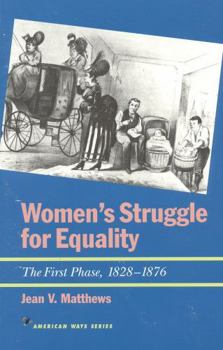Women's Struggle for Equality: The First Phase, 1828-1876
(Part of the American Ways Series Series)
Select Format
Select Condition 
Book Overview
Jean Matthew's new study of the early years of the women's rights movement outlines the period from 1828 to 1976 as a distinct "first phase." Ms. Matthews situates this early feminist activity within the lively nineteenth-century debate over the Woman Question and pays attention to the opponents as well as the advocates of equal rights for women. Her book demonstrates that the intense conflict generated by the movement was due less to any specific...
Format:Paperback
Language:English
ISBN:1566631467
ISBN13:9781566631464
Release Date:February 1998
Publisher:Ivan R. Dee Publisher
Length:223 Pages
Weight:0.61 lbs.
Dimensions:0.7" x 5.3" x 8.2"
Customer Reviews
1 rating
Insightful introduction into early years of feminism
Published by Thriftbooks.com User , 20 years ago
As Jean Matthews demonstrates in this excellent survey, feminism has long been a controversial movement. From its origins in Enlightenment thinking, it has challenged longstanding beliefs about women and male-female relationships. Matthews' book offers a study of the emergence of the women's movement in mid-nineteenth century America, charting both its broader intellectual origins and the context of contemporary reform movements. Both strands are integral to understanding how feminism developed as it did. Matthews starts by describing traditional views of women, views that were under assault by Enlightenment ideas about equality and natural rights. The first gains were made in education, where the assumptions of women's mental inferiority to men came under increasing assault. Yet from the first there were disagreements within the incipient movement, as education advocates such as Catherine Beecher balked at the more radical ideas of Frances Wright and others. One of the great strengths of the book is in Matthews's explanation of the ties between the women's movement and the swelling reform movements of the 1830s and 1840s. Many women joined the crusade for moral reform, gaining experience that would later be applied to campaigns for women's rights. No effort proved to be more important, though, than the campaign against slavery. Here women joined a campaign demanding liberty for a population legally defined as second-class people, just as women were at that time. Though Matthews eschews the idea of a direct evolution, she does acknowledge the influence, as well as the fact that many of the early male supporters cam from the ranks of the abolitionists. Yet the Civil War represented a turning point for the movement. Many feminists felt it necessary to subordinate their activities to the cause of abolition, while others (such as Susan B. Anthony) were determined to press ahead. But the greater division came with the end of the war. Many feminists saw the postwar measures to grant African Americans the right to vote as the perfect opportunity to extend the franchise to women as well. Yet many abolitionists preferred the viable goal of enfranchising African American men to the more radical one of universal suffrage, which threatened to complicate the issue. In response, leaders such as Elizabeth Cady Stanton increasingly adopted elitist language that alienated many within the abolitionist movement, ending their support for women's suffrage. This elitist tone foreshadowed the changing social complexion of the women's movement during the 1870s. Increasingly, upper-middle-class women were joining the ranks of feminists, at the same time that many in the movement began to argue for the moral superiority of women to men. Yet sexuality threatened to shatter the feminist movement in the 1870s, as debates shifted to questions of "free love" and controlling childbearing. Matthews concludes with the presentation of the Declaration of Rights





